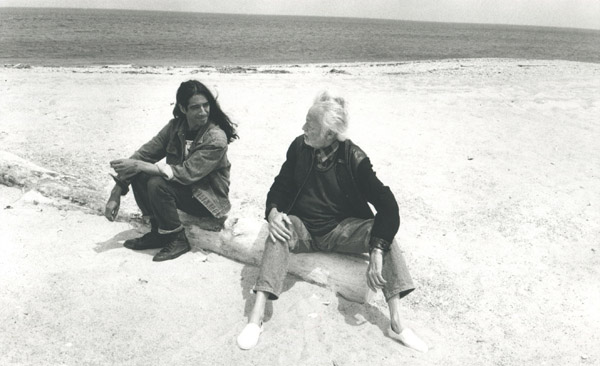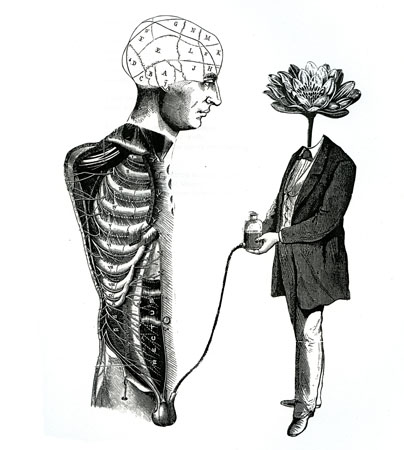Remembering Ronnie Burk
Todd Swindell
September 2015
 Ronnie Burk & Charles Henri Ford in Montauk, Late 90s, photo by Indra Tamang
Ronnie Burk & Charles Henri Ford in Montauk, Late 90s, photo by Indra Tamang
This piece was written for the website ACT UP Archives in honor of what would have been poet Ronnie Burk’s 60th birthday. This is an expanded edition.
photo
Photo-Mantic
I was Born
bonsai-ed
in a Texas Town
fifty years
before the Great War
burnt holes
in the ceiling of
the World
– from the poem “1996”
Ronnie Burk- April Fool, Surrealist Chicano Poet, Bad Ass Motherfucker
Since his death a dozen years ago, there has recently begun a renaissance of Ronnie’s legacy as a prophetic artist and fearless activist as academic scholars who have discovered his voice and vision are bringing new insights into the power of Ronnie Burk’s work.
In spite of the hardship of his troubled adolescence in racist and homophobic South Texas, Ronnie’s alchemical artistry, and belief in the magical, allowed him to transcend society’s prohibitions in order to create a body of work that pushed the forms of Surrealist imagination and radical political activism.
Ronnie was among the first students at Naropa University in the mid-1970s where he spent summers studying the teachings of Tibetan Rinpoche Chögyam Trungpa, met Beat writers like Allen Ginsberg, William Burroughs and Gregory Corso as well as Diane Di Prima, who became one of his mentors.
After his summertime stints in Boulder, Ronnie returned to San Antonio to participate in the cultural and political activities in the Chicano community. In 1977 his first poems were published in Caracol: La Revista de la Raza, which was founded and edited by Cecilio García-Camarillo and Mia Kirsi Stageberg. Together they traveled to the fourth Floricanto Festival (a national festival of Chicano literature) where he met poet and editor Lorna Dee Cervantes. She later published Ronnie’s first chapbook En el Jardín de los Nopales (In the Garden of Prickly Pear Trees, 1979) as a Mango Publication. This activity brought him into contact with Chicana poet and novelist Ana Castillo.
In the early 1980s, Ronnie lived in New York City where he became friends with Surrealist poet Charles Henri Ford and photographer, filmmaker and poet Ira Cohen. He was also involved with many of the then young filmmakers of the Lower East Side including Richard Kern, David Wojnarowicz and Ronnie’s close friend Tommy Turner. He participated in the Nuyorican Poets Café with Miguel Algarín and Miguel Piñero and attended performances by the Living Theater.
Though he was adept at creating collage in the spirit of Max Ernst and assemblages that recalled that playful wonder of Joseph Cornell, Ronnie’s true calling was that of the poet. Like his great inspiration, André Breton, he sought liberation through the transformative disruption of Surrealism through which Ronnie created a magical connection with traditions that came from being born north of the border and of Indigenous Mexican descent- that is Nahuatl poetics.
I first Ronnie met in 1996 as a member of ACT UP San Francisco- the AIDS Coalition to Unleash Power. Having lost friends in the late-’80s to AZT poisoning and been exploited by the San Francisco AIDS Foundation when seeking emergency housing, he was turned on by the group’s aggressive, theatrical demonstrations that challenged complacency, conflict of interest and greed within the AIDS industry. During the ten years he lived in San Francisco, Ronnie transited between poetic and political circles. Among his friends were surrealist poets Philip Lamantia and Will Alexander.
It was Ronnie who first introduced me to the legendary poet Harold Norse, whom I’d admired since first discovering Beat literature as an adolescent. Little did I know that Harold would become both my mentor and friend or that I would eventually prepare his archives for UC Berkeley then publish the first posthumous collection of Harold’s poetry. But then Ronnie was always a force for enchantment.
In 2012 Kolourmeim Press published Sky*Boat, a collection of his poems and collages. Ronnie left behind an extensive amount of writing and critical analysis as a member of ACT UP San Francisco. Crafting incisive political broadsides and letters to the editor, impassioned public comment at the Board of Supervisors, to taking the bullhorn at animal liberation demonstrations, Ronnie’s fervent advocacy on behalf of the poor, marginalized and oppressed continues to reverberate. Through a combination of theater and ritual, he remained an omnipresent thorn in the side of the gay political elite, challenging their absurd petit-bourgeois conformist values.
There remains an abundance of material from Ronnie’s bold and controversial activism as an HIV-positive gay man of Indigenous Mexican descent, a court jester to the AIDS industry, that will continue to inflame and inspire.
Listen- Sun Ra, MC5, Billie Holiday and Nina Hagen
Watch- Grey Gardens, Modern Times, Brain Candy and The Discreet Charm of the Bourgeoisie
Read- Mina Loy, Harry Crosby, Ana Castillo and Federico Garcia Lorca
Remember- Sitting Bull, Assata Shakur, Alex Nieto and Marilyn Buck
*Invaluable biographical information came from Inés Hernandez-Ávila, ‘Ronnie Burk,’ Dictionary of Literary Biography: Chicano Writers, vol. 209, third series, ed. Francisco A. Lomelí and Carl R. Shirley (Detroit: Gale Group, 1999)
To read more about the ACT UP Archives visit http://actuparchive.stevehuggins.com
 Untitled Collage
Untitled Collage
INVISIBLE WORLD
Song for the ancestors
See this hair?
You can have this hair
Long, black, Indian hair
All those dead Indians
will come back
to live inside you
Here! take this hair
and may it give you enough strength
to live a million lives
See these hands?
You can have these hands
You’ll be surprised
at the things
they can do for you
Here! take these hands
and may you find enough love
to hold onto
See these eyes?
You can have these eyes
They can see very far
Here! take these eyes
and may you see
to the end of many skies
from Sky*Boat
Ronnie Burk reading in August of 2000 with Harold Norse
Tape by Kush from Cloud House
